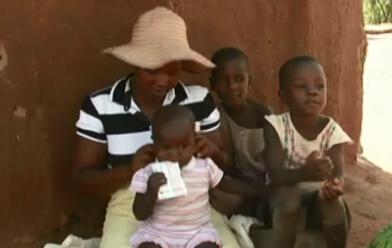The number of people facing hunger in Zimbabwe due to drought has risen from three to four million.
津巴布韦因干旱而面临饥饿的人数已从三百万上升到四百万人。
The UN children’s agency UNICEF says the poor southern African country is experiencing the worst drought in two decades – induced by a powerful effect from El Nino.
联合国儿童基金会表示,贫穷的南部非洲国家正经历着20年来最严重的干旱,由厄尔尼诺强大的影响引起。
Water is also scarce. Women have to walk for long distances in search of supplies.
水也很稀少。妇女们要走很远的路寻找供应。
The distance we have to cover to get to water is great. Sometimes we are carrying babies on our backs. Look how dirty I am! There is a big water problem here.
要获得水我们要走很远的距离。有时我们背着婴儿。看看我有多脏!这里严重缺水。
health workers weigh children in Mwenezi in southern Zimbabwe, one of the worst hit regions.
医护人员在津巴布韦南部姆韦内济给儿童称重,那里是受灾最严重的地区之一。

The number being treated for malnutrition at the local hospital rose from four in January to 25 in March.This baby is one of those being treated.
在当地医院,营养不良的治疗人数从一月份的4人上升到四月份的25人。这个婴儿就是其中之一。
Her mother says When she first fell ill she has stomach problems, then her feet started to swell so I took her to hospital.
她的母亲说,当她第一次生病时有肠胃问题,然后她的脚就开始肿胀,所以我带她来医院。
Aid agencies warn the lack of water may result in the spread of diseases.
援助机构警告称,水的缺乏可能会导致疾病的蔓延。
Earlier this year Zimbabwe’s government declared a state of national disaster and appealed for 1.4 billion euros in food aid.
今年早些时候,津巴布韦政府宣布一项全国性的灾难,并呼吁14亿欧元的粮食援助。
译文属可可原创,仅供学习交流使用,未经许可请勿转载。












